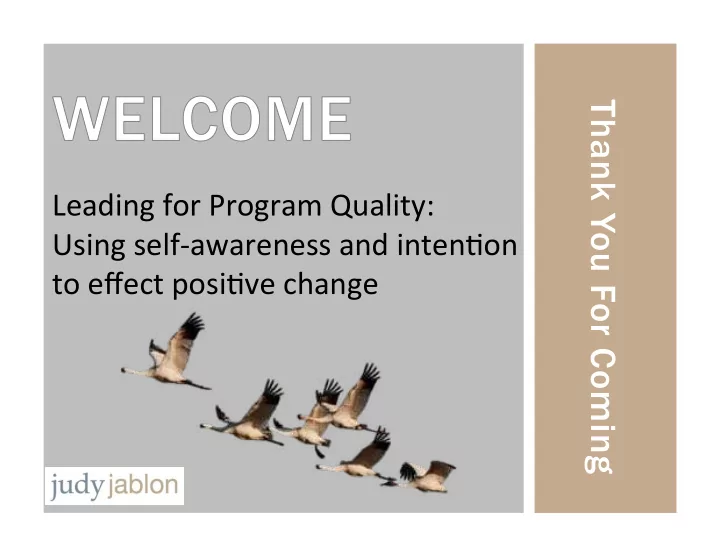

Thank You For Coming Leading for Program Quality: Using self-awareness and inten8on to effect posi8ve change
Who has joined our conversation today? In your primary role, do you: 1. lead adult adults in a program, school, or agency? 2. lead ch children in a classroom, center, or family child care setting? 3. support leaders and teachers?
¡ The capacity to recognize your feelings, preferences, biases, emo8ons ¡ To understand your cogni8ve, physical and emo8onal self ¡ To understand how all of these aspects of self influence decisions and behaviors Self-awareness is the cornerstone of emotional intelligence.
Research states that self-awareness is the most cri8cal leadership skill and the strongest predictor of overall success . (Nicol & Sparrow 2010). § Leaders AWARE of their weaknesses hire others who perform well in these areas. § Leaders RECOGNIZE members of their team may have an idea that is even beOer than their own.
Reactive Responsive Despite constant busyness, Too much to do, always in make intentional decisions a rush, juggling too many and have strategies in balls, no real time to place to deal with difficult think things through… situations…
Which describes your typical day. 1. Mostly I'm reactive and have regrets about my actions. 2. I alternate between reactive and intentional. 3. To respond with intention, I build in reflection time.
It’s not just about getting the job done… It’s about leading others to success. This requires self-awareness and intention.
How’s the pace of this webinar? 1. Much too slow 2. A bit too slow 3. About right 4. A bit too fast 5. Much too fast
I can only judge things from my experience. Questions help to increase my self-awareness.
Perspective Taking
Self-awareness & Intention
competitive easy going cranky collaborative friendly cliques Philosophical differences productive resistance complacency shared vision tense burnout high stress gossipy helpful motivated hostile
Passion Authenticity Willingness to take risks Creativity Humor You Perseverance Model Love of Learning Patience High Energy Flexibility Respect Pragmatism
¡ With yourself § At different points in the day § Pause to see how you are § Use a journal ¡ Ask a trusted colleague
• Before you get to work • During arrival • Mid morning • Lunch • Rest • The afternoon • At the end of the day • At home
What questions do you ask yourself? ¡ How do you organize your time? ¡ Do you plan for low stress and high stress times? ¡ Do you set realistic expectations? ¡ How do you establish and prioritize to do lists?
TIME MANAGEMENT Finding The Right Balance
TIPS: ¡ Always plan for the unexpected. ¡ Make delegation a natural part of your style. ¡ Establish a committee or task force to help. ¡ Plan a time each day to refuel and encourage staff to do the same!
Communication Verbal and Non Verbal
¡ What is your routine? ¡ How much time do you spend? ¡ What messages do you convey? ¡ Does everyone get equal time?
¡ Do you “shoot” them all day long? ¡ Are they coming at you all day long and as a result you are reacting and shooting them right back?
¡ Do you plan them all? ¡ Is there content or administrivia? ¡ Does your staff know in advance what the agenda is? ¡ How do you set up the room? ¡ What messages do you want staff to experience when you are gathered as a group? ¡ How does this affect the program climate?
¡ Commit to a conversation about connecting with your staff and enhancing the climate of your program. ¡ Explore these ideas with a learning partner: § A friend § Another leader § A coach
Did you find this webinar important to your work? 1. Not very important 2. Somewhat important 3. Important 4. Extremely important
Would you like to explore this topic in more detail? 1. Definitely. 2. I’m unsure. 3. No thank you.
¡ Managers administer for stability, have subordinates, adopt clear short-term objec8ves, focus on details, and are oriented towards comple8ng tasks. ************** ¡ Leaders administer for change, have followers, focus on long-term vision, set direc8on, and are oriented towards inspiring people to achieve results.
judy@judyjablon.com www.judyjablon.com Twitter: @judyjablon Find me on Facebook! www.PowerfulInteractions.com Twitter: @p_interactions
¡ Time management for directors. http://ccic.dcf.wi.gov/sites/default/files/pdf/newsart/64/ Time_management_for_directors.pdf ¡ Twelve characteristics of effective early childhood teachers. https://www.naeyc.org/files/yc/file/200803/BTJ_Colker.pdf ¡ Effective leadership behaviors for child care administrators. http://ndc.ndgrowingfutures.org/files/pdf/EffectiveLeadership.pdf ¡ Principle-centered leadership in early childhood education. http://southernearlychildhood.org/upload/pdf/ Principle_Centered_Leadership_in_Early_Childhood_Education_Victoria_Car r_Lawrence_J_Johnson_Connie_Corkwell_Vol_37_No_3_1.pdf ¡ Nicol J. & Sparrow, P.R. (2010). Powerful leadership: the importance of self-awareness in extending range. Lancaster University Management School Centre for Performance-led HR Thought Leadership Paper, Number 2010-01, available: http://www.lums.lancs.ac.uk/cphr
Recommend
More recommend